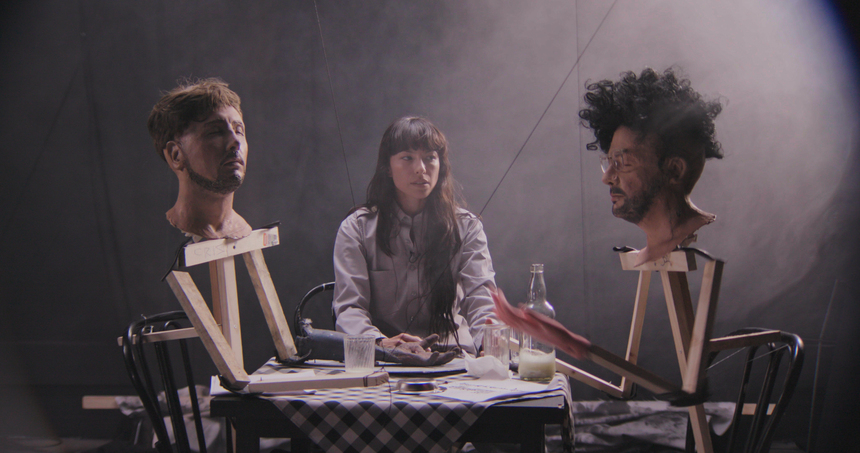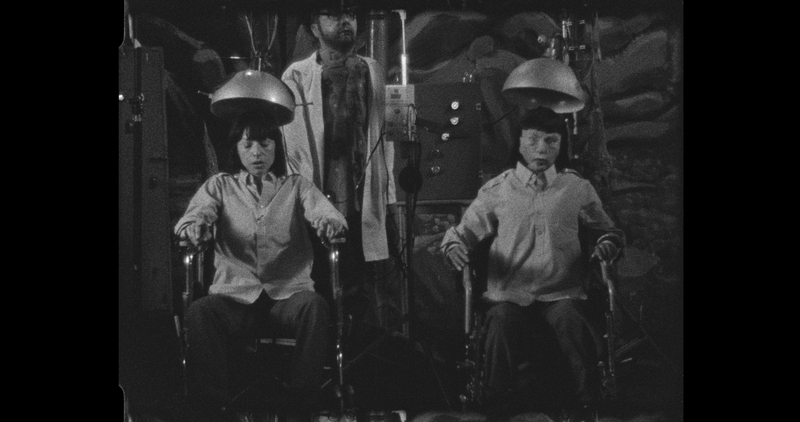Montreal Nouveau 2024 Review: THE HYPERBOREANS, The Puppetry of Memory

Human memory is fallable, at least on an individual level; though as some cultures can tell you, a poor memory has also been of great service to larger groups of people who need to forget, or need others to forget, terrible histories and terrible deed enacted upon others. Such has been the case for many countries in the 20th and 21st centuries, to the point where we need indivisual memory, fallable as it is, to try and remember what happened.
But how do we remember the past, especially the terrible events, and people, and how do we incorporate them into history? Chilean filmmakers Joaquín Cociña and Cristóbal León set themselves this task in looking at the life and writing of Miguel Serrano, a writer and politician who was also a Nazi apologizer and Fascist activist. A straightforward biopic would be too kind to the man; neither would a traditional documentary suffice to convey the layers of trauma that someone like Serrano, who believe that Hitler fled to Antartica to hide out in an underground paradise, would have caused through Chilean history.
Combining stop motion animation, theatrical backdrops, live actors and puppets, The Hyperboreans is in part telling the story of a stolen film, through the memory of its actor, Antonia Giesen, who is also a clinical psychologist. Playing herself, she tells of acting in film whose negative was stolen, and so she must recount it for us: sometimes through her own persona, sometimes in conjunction with one of her patients, whose name she cannot recall and so she refers to him as Metalhead (Francisco Visceral). Metalhead, apparently, had written the script as directly dictated to him by Serrano. Antonia is our guide, but she is also herself, and the various characters she plays, as she relates the strange life and philosophy of Serrano, and what that life meant to Chilean memory.
By design, it would seem, while Antonia begins her story in a more clinical fashion, as per her psychologist demeanor, it's not long before this slips into more of a storyteller mode. Aiding this are the director's various practical effects - curtain backdrops that are reminiscent of theatre, asking the audience to feel as if they are in the room with Antonio, that this is a direct emotional experience. The puppets, often the heads of the directors themselves on wodden sticks, or paper faces on flat bodies, both separate the audience from the figures, as well as allow us to examine them, perhaps not without fear exactly, but attempting to make us understand how people become characters, often to the detriment of those absorbing their words.
What harm can a puppet do, we might ask ourselves? But what is that puppet were espousing Nazi rhetoric, strange esoteric delusions and conspiracy theories. And what if too many people believed it. But this is as much a personal journey as it is, a collage of psychoanalysis of a country. Or perhaps these are more intertwined than we want to believe. As we follow Antonia on her journey, as she is sometimes herself, sometimes the character she played in the movie - a seeming low-level bureaucrat who struggles to care for aging parents - we're asked to consider the banalaty of evil, the ordinaryness of most lives under the weight of fascism, and how everything can seem unrealin such a state.
No wonder León and Cociña turn to stop-motion animation and puppetry to express their story. There is no way to realistically process that which has been tainted, as it were, by time and memory. We remember in fits and starts; everything becomes destorted, for better or worse - people are not whole, but often two-dimensional. We remember how moments made us feel, not how they were.
And perhaps this is what León and Cociña are trying to convey: how is an entire country supposed to process the lies and trauma of decades if nothing can be remembered exactly how it was. We can only trust ourselves and we know our own selves cannot be trusted; but trust we must, and filter we must, through artistic expression. The Hyperboreans, taking its name from mythical people who lived in a paradise that never existed, ask us to remember that: these paradises people like Sorreno want to mythologize are never anything but myth, as fallible and fragile as paper and paint.








